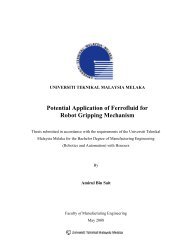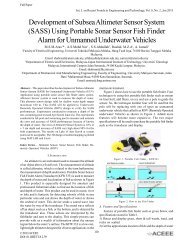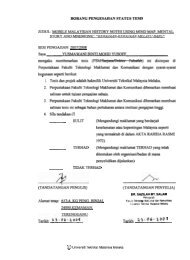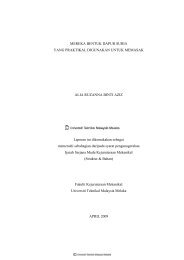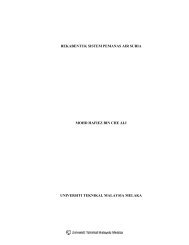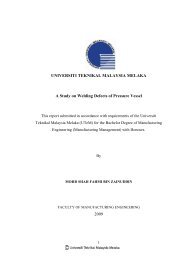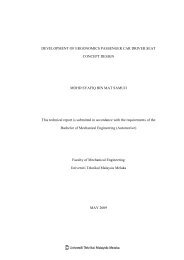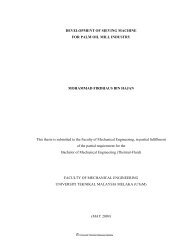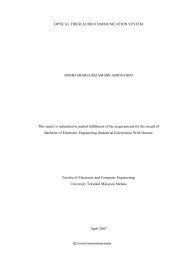Brand, Identity and Reputation: Exploring, Creating New Realities ...
Brand, Identity and Reputation: Exploring, Creating New Realities ...
Brand, Identity and Reputation: Exploring, Creating New Realities ...
Create successful ePaper yourself
Turn your PDF publications into a flip-book with our unique Google optimized e-Paper software.
a potentially significant impact on clothing retailers‘ sustainable practices. It is anticipated that there will be a positive<br />
response to participating in the study by several retailers, as some of the key retail br<strong>and</strong>s (for example, the Arcadia<br />
Group <strong>and</strong> Tesco) participated in Defra‘s research into public underst<strong>and</strong>ing of sustainable clothing within stakeholder<br />
briefings (Fisher et al, 2008). 21 clothing retailers are members of the Ethical Trading Initiative (ETI) a voluntary<br />
industry body which seeks to improve ethical practice within the organisations concerned (ETI, 2010) demonstrating<br />
the active interest of retailers in ethical issues. The ETI has been approached to seek its support in requesting the<br />
participation of some of their members. The aim is to interview respondents from between six to ten UK retailers. The<br />
findings can therefore not be generalised across the whole market sector, but can be used as case studies.<br />
Findings<br />
Interviews will relate to environmental <strong>and</strong> social sustainability issues, including the use of materials which are organic<br />
or recycled <strong>and</strong> Fairtrade production of fabrics <strong>and</strong> clothing. Retailers‘ responses to consumers‘ views will be recorded.<br />
Findings will be shared with the participating companies. The findings of studies on the ethical fashion market <strong>and</strong><br />
consumers‘ sustainable behaviour towards clothing (Hustvedt <strong>and</strong> Dickson, 2009; Fisher et al, 2008; Joergens, 2006;<br />
Iwanow, H., McEachern, M.G., <strong>and</strong> Jeffrey, A. 2005) have been evaluated in order to establish potential strategies<br />
which clothing retailers could adopt to improve the sustainability of their clothing ranges. These strategies could enable<br />
retailers to support customers to purchase, maintain <strong>and</strong> dispose of clothing more sustainably. Facilitating the<br />
implementation of such strategies will be discussed in the interviews. Possible barriers to implementing more<br />
sustainable strategies, such as financial, technical <strong>and</strong> practical aspects, in addition to conflict with existing corporate<br />
strategies, will also be explored. A key topic for discussion in the interviews will be choice editing retailers‘ ranges to<br />
limit their impact on the environment by offering more products which are produced by Fairtrade manufacturers or are<br />
made from environmentally <strong>and</strong> socially sustainable materials such as organic cotton or recycled fabric.<br />
The interviews will also cover ways in which retailers can influence their customers‘ laundering, repair <strong>and</strong> disposal of<br />
clothes, which have a greater negative impact on the environment than clothing manufacture <strong>and</strong> distribution (Allwood,<br />
Laursen, Rodriguez <strong>and</strong> Bocken, 2006). Though these elements may be perceived as being outside of the remit of<br />
clothing retailers, stores could influence consumers by providing them with information about the maintenance <strong>and</strong><br />
disposal via, for example, garment labelling <strong>and</strong> printed or online resources. Supplying this type of information <strong>and</strong><br />
offering repair services could form part of the retailers‘ CSR strategies, rather than viewing them in terms of their<br />
profitability. The provision of recycling facilities in stores or shopping centres would enable retailers to provide a<br />
closed loop supply chain.<br />
The sustainable strategies to be proposed to retailers in the interviews could meet with resistance due to the financial<br />
implications for the companies, though many could be implemented at limited expense, for example the dissemination<br />
of information about sustainability company websites <strong>and</strong> garment labels.<br />
Original value<br />
Consumer‘s views on sustainable clothing consumption have been explored in various previous studies but retailers‘<br />
views have not yet been investigated in the literature. This research has value for retailers in general (not just limited to<br />
those involved in the study) <strong>and</strong> to academics in the fields of both retailing <strong>and</strong> sustainability.<br />
Implications/limitations<br />
The research outcomes could have implications for clothing retailers‘ CSR policies <strong>and</strong> practice, ultimately enabling<br />
consumers to adopt more sustainable practices towards clothing consumption. This study is limited to one retail sector<br />
in the UK <strong>and</strong> future research could cover a wider range of retailers at different market levels or in different countries.<br />
Keywords: Sustainability, CSR, retail br<strong>and</strong>s, clothing<br />
References<br />
1. Allwood, J.M., Laursen, S.E., de Rodriguez, C.M. <strong>and</strong> Bocken, N.M.P. 2006. Well Dressed? The present <strong>and</strong> future sustainability of clothing <strong>and</strong><br />
textiles in the UK. Cambridge: Cambridge University Institute of Manufacturing.<br />
2. BBC 2008. ‗Panorama: Primark on the Rack‘ TV programme broadcast on BBC1, 23 rd June 2008.<br />
http://news.bbc.co.uk/1/hi/programmes/panorama/7461496.stm<br />
3. Bianchi, C. <strong>and</strong> Birtwistle, G. (2010) 'Sell, give away, or donate: an exploratory study of fashion clothing disposal behaviour in two countries',<br />
The International Review of Retail, Distribution <strong>and</strong> Consumer Research, Vol. 20: 3, pp. 353-368.<br />
4. Birtwistle, G., <strong>and</strong> Moore, C.M. 2007. ‗Fashion clothing – where does it all end up?‘ International Journal of Retail <strong>and</strong> Distribution<br />
Management. 35:3, 210-216.<br />
5. Carrigan, M., <strong>and</strong> Atalla, A. 2001. ‗The myth of the ethical consumer; do ethics matter in purchase behaviour?‘ Journal of Consumer Marketing.<br />
18: 7, 560-578.<br />
6. Cathcart, A. 2006. ‗A quite unreasonable state of affairs: Corporate Social Responsibility <strong>and</strong> the John Lewis Partnership.‘ Social Responsibility<br />
Journal, 2:2, 201-206.<br />
7. Clean Clothes Campaign 2010. http://www.cleanclothes.org/<br />
8. Co-operative Bank, 2009. The Ethical Consumerism Report. http://www.goodwithmoney.co.uk/ethicalconsumerismreport/<br />
9. Defra, 2009. Maximising reuse <strong>and</strong> recycling of UK clothing <strong>and</strong> textiles. London: Defra.<br />
http://www.defra.gov.uk/environment/business/products/roadmaps/clothing/documents/reuse-recycling.pdf<br />
10. Ellis, N. <strong>and</strong> Higgins, M. 2006. ‗Recatechizing codes of practice in supply chain relationships: discourse, identity <strong>and</strong> otherness.‘ Journal of<br />
Strategic Marketing, 14:4, 387-410.<br />
216



